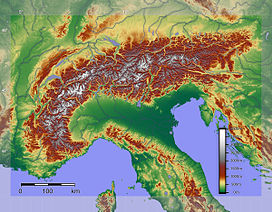এল্পছ
এল্পছ (Alps) ইউৰোপ মহাদেশৰ সৰ্ব্বোচ্চ আৰু বহুলভাৱে বিস্তৃত হৈ থকা পৰ্বতমালা[1]। প্ৰায় ১২০০ কিমি জুৰি থকা এই পৰ্বতমালা আঠখন দেশ ফ্ৰান্স, ম’নাক’,ছুইজাৰলেণ্ড, জাৰ্মানী, ইটালী, অষ্ট্ৰিয়া, লিকটেন্সটেইন (Liechtenstein) আৰু শ্ল’ভেনিয়া পৰ্যন্ত বিস্তৃত হৈ আছে[2]। এল্পছ পৰ্বতমালাতকৈ অধিক উচ্চতাৰ ক’কেছাছ পৰ্বতমালা (Caucasus Mountains) আৰু অধিক বিস্তৃত হৈ থকা উৰেলছ (Urals) পৰ্বতমালাৰ কিছু অংশ এছিয়াত অৱস্থিত।
| Alps | |
|---|---|
 Mont Blanc, the highest mountain in the Alps, view from the Savoy side | |
| উচ্চতম শিখৰ | |
| শৃংগ | Mont Blanc |
| উচ্চতা | 4,810 মিটাৰ (15,780 ফুট) |
| স্থানাংকসমূহ | 45°50′01″N 06°51′54″E / 45.83361°N 6.865°E |
| ভূগোল | |
Relief of the Alps. See also map with international borders marked | |
| দেশসমূহ | List
|
| স্থানাংক প্ৰসাৰ | 46°30′20″N 9°19′49″E / 46.5056°N 9.3303°Eস্থানাংক: 46°30′20″N 9°19′49″E / 46.5056°N 9.3303°E |
| Geology | |
| Orogeny | Alpine orogeny |
| সময় | Tertiary |
| Type of rock | Bündner schist, flysch and molasse |
ভৌগোলিক বিৱৰণ
সম্পাদনা কৰকএল্পছ পৰ্বতমালা আফ্ৰিকান আৰু ইউৰেছিয়ান টেক্ট’নিক প্লেট (tectonic plate) ৰ সংঘৰ্ষৰ ফলত বহুবছৰ জোৰা এক প্ৰক্ৰিয়াৰে উদ্ভৱ হৈছে। এই পৰ্বতমালাৰ আকাৰ আৰু উচ্চতাই ইউৰোপ মহাদেশৰ জলবায়ুত যথেষ্ট প্ৰভাৱ পেলায়।
ইতিহাস
সম্পাদনা কৰকএল্পছত পেলিঅ’লিথিক যুগৰ পৰাই মানুহৰ বসতি আছিল বুলি ধাৰণা কৰা হয়। ১৯৯১ চনত অষ্ট্ৰিয়া-ইটালীৰ সীমাৰ এক বৰফাবৃত শিখৰত ৫০০০ বছৰ পূৰ্বৰ বুলি ধাৰণা কৰা এক মামী পোৱা গৈছিল। তথ্য অনুসৰি হানিবাল (Hannibal) সকলে পোহনীয়া হাতীৰ জাক এটা লৈ এল্পছ পৰ্বতমালা অতিক্ৰম কৰা বুলি জনা যায়। এই পৰ্বতমালাত ৰোমানসকলেও বসতি স্থাপন কৰিছিল। ১৮০০ চনত নেপোলিয়ন বোনাপাৰ্টে ৪০,০০০ সৈন্য লৈ এল্পছৰ এটা বাটেৰে পাৰ হৈ যোৱাৰো তথ্য পোৱা যায়। ওঠৰ আৰু উনৈশ শতিকাত এই পৰ্বতমালাৰ বিভিন্ন অংশলৈ জীৱবিজ্ঞানী, সাহিত্যিক, চিত্ৰকৰ আদিৰ আগমণ ঘটে। ইয়াৰ পৰৱৰ্ত্তী সময়ত বহুতো পৰ্বতাৰোহণকাৰীৰ পয়োভৰ ঘটে। দ্বিতীয় বিশ্বযুদ্ধৰ সমগ্ৰ সময়ছোৱাত হিটলাৰে বেভেৰিয়ান এল্পছত এটা কেম্প (base of operation ) স্থাপন কৰি ৰাখিছিল।
জৈৱবৈচিত্ৰ্য
সম্পাদনা কৰকএল্পছ পৰ্বতমালাৰ সৰ্বোচ্চ শিখৰত অৰ্থাৎ 3,400 মিটাৰ (11,155 ফুট) ৰ ওপৰলৈ আইবেক্স নামৰ জন্তুবিধে বাস কৰে। শিলাময় অঞ্চলসমূহত 'Edelweiss' নামৰ উদ্ভিদবিধ সাধাৰণতে অধিক দেখিবলৈ পোৱা যায়।
অন্যান্য
সম্পাদনা কৰকএল্পছৰ বহুতো অঞ্চলত এতিয়াও পৰম্পৰাগতভাৱে খেতি, চীজ তৈয়াৰ কৰা আৰু কাঠৰ বেহা চলি আহিছে। বিংশ শতিকাৰ আৰম্ভণিতে পৰ্য্যটন উদ্যোগৰ যথেষ্ট বিকাশ হয়। শীতকালীন অলিম্পিক প্ৰতিযোগিতা এল্পছৰ বিভিন্ন অঞ্চল (Swiss, French, Italian, Austrian আৰু German Alps) ত অনুষ্ঠিত হৈ আহিছে। বৰ্তমান এই পৰ্বতমালাত ১৪ মিলিয়ন লোকে বসবাস কৰি আছে আৰু প্ৰতিবছৰে ইয়ালৈ ১২০ মিলিয়ন পৰ্য্যটকৰ আগমণ হয়[3]।
তথ্যসূত্ৰ
সম্পাদনা কৰক- ↑ "Alps". The Hutchinson unabridged encyclopedia with atlas and weather guide. Abington, United Kingdom: Helicon. 2014. (Subscription required (help)).
- ↑ "Alpine Convention" Archived 2011-07-29 at the Wayback Machine. Alpine Conferences. Retrieved August 3, 2012
- ↑ Chatré, Baptiste, et al. (2010), 8
লগতে চাওক
সম্পাদনা কৰক- Allaby, Michael et al. The Encyclopedia of Earth. (2008). Berkeley: University of California Press. ISBN 978-0-520-25471-8
- Beattie, Andrew. (2006). The Alps: A Cultural History. New York: Oxford University Press. ISBN 978-0-19-530955-3
- Benniston, Martin, et al. (2011). "Impact of Climatic Change on Water and Natural Hazards in the Alps" Archived 2013-06-03 at the Wayback Machine. Environmental Science and Policy. Volume 30. 1–9
- Cebon, Peter, et al. (1998). Views from the Alps: Regional Perspectives on Climate Change. Cambridge MA: MIT Press. ISBN 978-0-262-03252-0
- Chatré, Baptiste, et al. (2010). The Alps: People and Pressures in the Mountains, the Facts at a Glance Archived 2015-05-13 at the Wayback Machine. Permanent Secretariat of the Alpine Convention (alpconv.org). Retrieved August 4, 2012. ISBN 978-88-905158-2-8
- De Graciansky, Pierre-Charles et al. (2011). The Western Alps, From Rift to Passive Margin to Orogenic Belt. Amsterdam: Elsevier. ISBN 978-0-444-53724-9
- Feuer, A.B. (2006). Packs On!: Memoirs of the 10th Mountain Division in World War II. Mechanicsburg, Pennsylvania: Stackpole Books. ISBN 978-0-8117-3289-5
- Fleming, Fergus. (2000). Killing Dragons: The Conquest of the Alps. New York: Grove. ISBN 978-0-8021-3867-5
- Halbrook, Stephen P. (1998). Target Switzerland: Swiss Armed Neutrality in World War II. Rockville Center, NY: Sarpedon. ISBN 978-1-885119-53-7
- Halbrook, Stephen P. (2006). The Swiss and the Nazis: How the Alpine Republic Survived in the Shadow of the Third Reich. Havertown, PA: Casemate. ISBN 978-1-932033-42-7
- Hudson, Simon. (2000). Snow Business: A Study of the International Ski Industry. New York: Cengage ISBN 978-0-304-70471-2
- Gerrard, AJ. (1990) Mountain Environments: An Examination of the Physical Geography of Mountains. Boston: MIT Press. ISBN 978-0-262-07128-4
- Körner, Christian. (2003). Alpine Plant Life. New York: Springer Verlag. ISBN 978-3-540-00347-2
- Lancel, Serge. (1999). Hannibal. Oxford: Blackwell. ISBN 978-0-631-21848-7
- Mitchell, Arthur H. (2007). Hitler's Mountain. Jefferson, NC: McFarland. ISBN 978-0-7864-2458-0
- Prevas, John. (2001). Hannibal Crosses The Alps: The Invasion Of Italy And The Punic Wars. Cambridge, MA: Da Capo Press. ISBN 978-0-306-81070-1
- Reynolds, Kev. (2012) The Swiss Alps. Cicerone Press. ISBN 978-1-85284-465-3
- Roth, Philipe. (2007). Minerals first Discovered in Switzerland. Lausanne, CH: Museum of Geology. ISBN 978-3-9807561-8-1
- Schmid, Stefan M. (2004). "Regional tectonics: from the Rhine graben to the Po plain, a summary of the tectonic evolution of the Alps and their forelands". Basel: Geologisch-Paläontologisches Institut
- Sharp, Hilary. (2002). Trekking and Climbing in the Western Alps. London: New Holland. ISBN 978-0-8117-2954-3
- Schmid, Stefan M.et al. (2004). "Tectonic map and overall architecture of the Alpine orogen" Archived 2006-11-27 at the Wayback Machine. Eclogae Geologicae Helvetiae. Volume 97. 93–117
- Shoumatoff, Nicholas and Nina. (2001). The Alps: Europe's Mountain Heart. Ann Arbor, MI: University of Michigan Press. ISBN 978-0-472-11111-4
- Viazzo, Pier Paolo. (1980). Upland Communities: Environment, Population and Social Structure in the Alps since the Sixteenth Century. Cambridge: Cambridge University Press. ISBN 9780521306638
